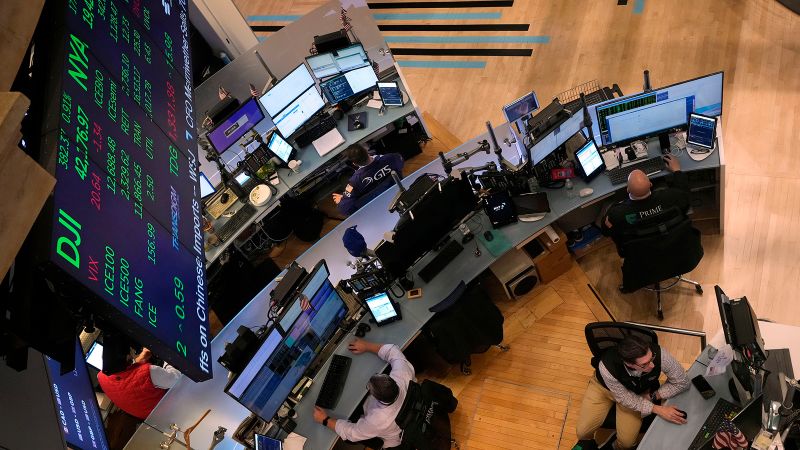New York
Markets were set to rise sharply Wednesday morning following a shift toward Republicans, including a decisive and consequential victory for former President Donald Trump in Tuesday’s US presidential election.
Dow futures soared 1,200 points, or 2.9%. Futures for the broader S&P 500 were 2.3% higher and the tech-heavy Nasdaq surged 1.8%.
In part, markets were probably juiced by the fact that the election was decided relatively quickly. The election has served as a cloud over the US economy and stock market in recent months. Markets, in particular, crave certainty, and the clear path forward will allow companies to adjust their business and hiring plans.
But stocks may also be reacting to Trump’s victory, in particular. Trump flipped several swing states from President Joe Biden’s 2020 victory, and Republicans also took control of the Senate. Several key House races remain undecided. A so-called red wave could usher in an era of deregulation and other pro-business laws and policies that investors believe could benefit the stock market.
“We think equities reprice higher as we clear the uncertainty, volatility decreases and hedges unwind, with investors refocusing on the Fed at a time when the economy and corporate earnings remain resilient,” JPMorgan analysts predicted in a report ahead of Tuesday’s election result. Under a “red wave,” the bank said stocks stood to gain through the end of 2024, but “the uncertainty around policy execution would become more prominent in 2025.”
However, markets and the economy have generally performed better under Democratic presidents though stocks have boomed regardless of which party controls the White House. The S&P 500 has grown an average of 10% under Democrats and 6.7% under Republicans, according to Sam Stovall at CFRA Research. Gross domestic product, the broadest measure of the US economy, has averaged 3.9% under Democratic presidents, well ahead of the 2.4% under Republicans.
Trump has advocated for policies, including tax breaks and increased public spending, that could pose problems for the economy and significantly increase America’s budget deficit. That devalued US Treasury bonds, and so yields, which trade in the opposite direction of bond prices, surged.
The 10-year bond yield rose above 4.4%, undercutting the Federal Reserve’s efforts to lower interest rates to boost the economy. The Fed had been hiking rates over the past couple of years to combat a devastating inflation surge. But it began cutting rates in September and is widely expected to cut again Thursday at the conclusion of its two-day policy meeting.
Although the fed funds rate can influence Treasury yields, consumer loans, including mortgage rates, auto loans and credit cards, are tied more closely to Treasury yields. So Trump’s victory, at least for now, appears to be keeping those rates somewhat higher.
Other so-called Trump trades, including shares of his social media stock, Trump Media & Technology Group, surged Wednesday morning. TMTG shares, which trade under the “DJT” symbol, soared 30%.
The US dollar also rose 1.7% against the euro and British pound to its highest level since July. The dollar could benefit from Trump’s radical plan to increase tariffs significantly, perhaps creating more demand for US goods at home although most economists oppose the plan and many suggest that it won’t change consumer behavior.
Trump’s tariff plan could, however, boost inflation, and that could also undercut the Fed’s rate-cutting efforts.
Bitcoin also rocketed to a new high near $74,000 Wednesday morning. Trump has warmed up to cryptocurrencies in recent months after broadly opposing them in his first term. Crypto has surged as Trump’s re-election chances appeared to increase.
European stocks underperformed their US peers Wednesday morning. The Stoxx Europe 600 index, the benchmark for the region, was up 1.3%. Germany’s DAX and France’s CAC rose 0.7% and 0.8% respectively, while London’s FTSE 100 was trading 0.9% higher on the day.
In Asia, the picture was mixed. Japan’s Nikkei 225 closed 2.6% higher, while Australia’s S&P ASX gained only 0.8%.
“A strong Trump presidency and a weak (Japanese) government should be a good combination for Japanese markets, particularly equities, as US pension money heading for Asia will continue to face challenges in investing in China,” said Neil Newman, head of strategy at Astris Advisory in Tokyo.
In China, the Shanghai Composite Index was broadly flat, while Hong Kong’s Hang Seng index closed 2.2% lower.
“Chinese equities sold off overnight in expectation of more tariffs on US imports from China,” Daniel Murray, deputy chief investment officer and head of research at EFG Asset Management, said in a note.
